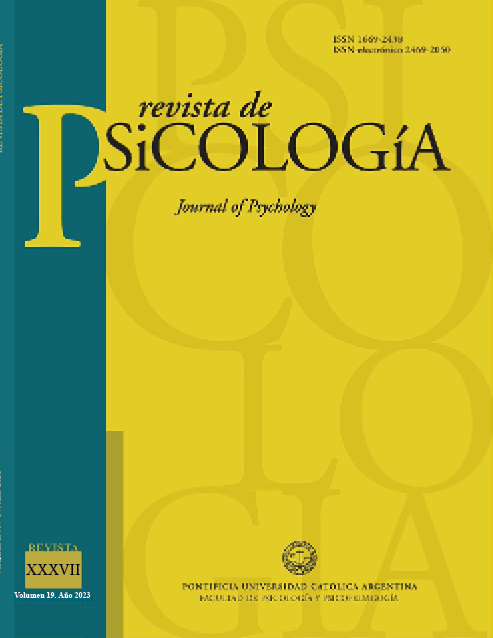Formal Logical Thought: Proposal of an Instrument for its Evaluation in Subjects of the First Level of Secondary Education
DOI:
https://doi.org/10.46553/RPSI.19.37.2023.p23-36Keywords:
formal operations, test, psychometric propertiesAbstract
The issue of formal thought is addressed, a Piagetian theme that has not lost its validity. The objectives of this work are: (a) To study the psychometric properties of an instrument for the evaluation of formal operative performance elaborated ad hoc from the Longeot (TOFLP) and Flexer and Roberge (FORT) tests; (b) Verify the order of acquisition of the formal operations evaluated in the proposed instrument.
A scalographic analysis of the items (Guttman technique) shows that the consistency and reproducibility indices are satisfactory and that the sequence of achievements and level of difficulty of each item conform to Piagetian theory. The validity and consistency of the instrument is tested.
Downloads
References
Backhoff, E., Larrazolo, N. y Rosas, M. (2000). Nivel de dificultad y discriminación del Examen de Habilidades y Conocimientos Básicos (EXHCOBA). Revista Electrónica de Investigación Educativa, 2(1), 1-16.
Ennis, R. (1976). An alternative to Piaget's conceptualisation of logical competence. Child Development, 17, 903-909.
Escurra Mayaute, L. M., Delgado Vásquez, A., Quesada Murillo, M. R., Rivas Castro, G., Santos Islas, J. y Pequeña Constantino, J. (2014). Adaptación psicométrica del test de operaciones formales combinatorias (T.O.F.C.) de Longeot de acuerdo al modelo de Mokken [en línea], vol. 2, no. 2, p. 57-77. ISSN 1560-909X.
Flexer, B. y Roberge, J. (1982). Formal operational reasoning test. Journal of Genetic Psychology, 106, 61-67.
Guttman, L. (1950): The basis for Scalogran analysis. En S. Stanffer y Otros. Measurement and Prediction. New Jersey: Princenton University Press.
Johnson-Laird, P. N. y Byrne, R. M. J. (1991). Deduction. Hillsdale, New Jersey: LEA.
Larivée, S. y Normandeau, S. (1985). Maîtrise du schème de la combinatoire chez des adolescents en classes espéciales. Canadian Journal of Education, 10(4), 345-361.
Lawson, A. E. (1995). Science teaching and the development of thinking. Belmont, CA: Wadsworth Publishing Company.
Longeot, F. (1964). Analyse Statistique de Trois Test Genetiques Collectifs. BINOP, 219-237.
Longeot, F. (1968). La pédagogie des mathématiques et le développ¬ment des opérations formelles. Enfance, 5, 379-389.
Martín, M. y Valiña, D. (2002). Razonamiento deductivo: Una aproximación al estudio de la disyunción. Revista de Psicología General y Aplicada, 55(2). 225-248.
Navarro-Pelayo, V., Batanero, C. y Godino, J. (1996). Razonamiento combinatorio en alumnos de secundaria. Educación Matemática, 8(1), 26-39.
Obando, G., Vasco, C. E y Sánchez-Matamoros, G. (2014). Enseñanza y aprendizaje de la razón, la proporción y la proporcionalidad: un estado del arte, Revista Latinoamericana de Investigación en Matemática Educativa, 17(1) 59-82.
Piaget, J. (1977). Recherches sur l'abstraction réfléchissante, Paris, Presses Universitaires de France.
Piaget, J. (1979). Tratado de lógica y conocimiento científico, Paidós, Bs.As.
Piaget, J. y Beth, J. (1961). Relaciones entre la lógica formal y el pensamiento real, Ed. Ciudad Nueva, Madrid.
Piaget, J. e Inhelder, B. (1951). La genèse de l'idèe de hasard chez l'enfant. Paris: Presses Universitaires de France.
Piaget, J. e Inhelder, B. (1973). De la lógica del niño a la lógica del adolescente, Paidós, Bs.As., Cap. XVIII.
Staudenmayer, H. y Bourne, L.E. (1978). The nature of denied propositions in the conditional reasoning task: Interpretation and learning. En; Russell Revlin y Richard E. Mayer (eds.), Human Reasoning. Distributed Solely by Halsted Press. pp. 83-99.
Wason, P. (1968). Reasoning about a rule. Quarterly Journal of Experimental Psychology, 20, 273-281.
Downloads
Published
How to Cite
Issue
Section
License
Copyright (c) 2023 Stella Maris Vazquez, Marianela Noriega

This work is licensed under a Creative Commons Attribution-NonCommercial-ShareAlike 4.0 International License.


















